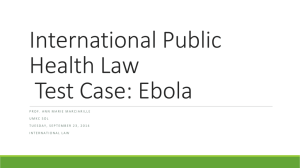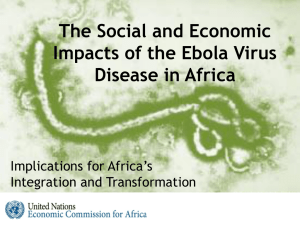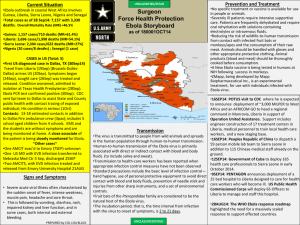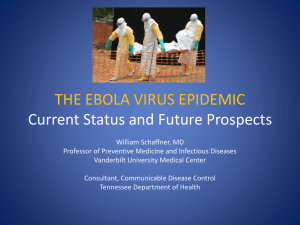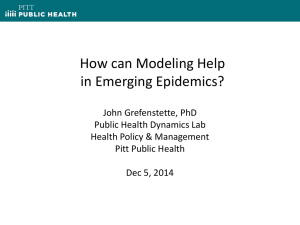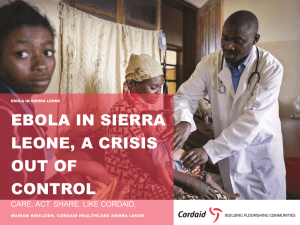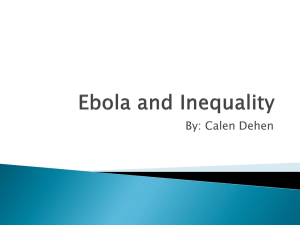ebola
advertisement
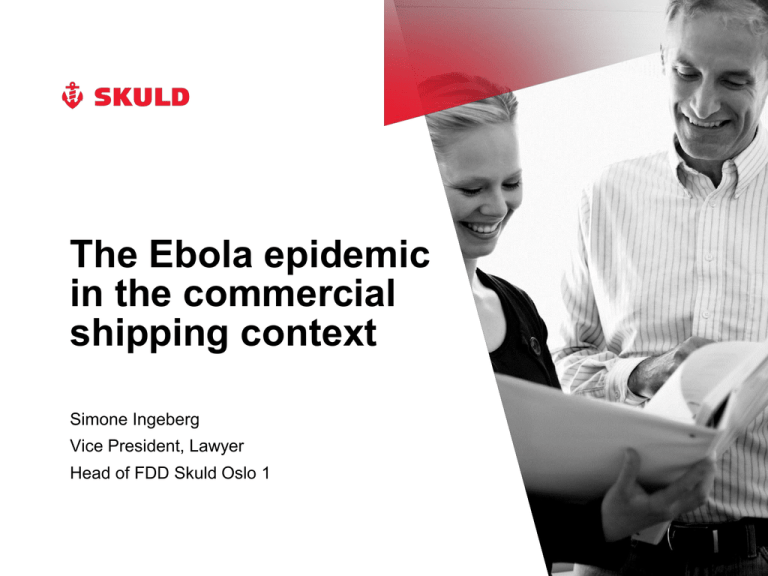
The Ebola epidemic in the commercial shipping context Simone Ingeberg Vice President, Lawyer Head of FDD Skuld Oslo 1 Outline • SKULD CLAIMS, UNDERWRITING AND LOSS PREVENTION • • • • • • • EBOLA PORTS PRACTICAL ADVICE FOR VESSELS CREW STOWAWAYS CASE EXAMPLES SUMMARY SKULD CLAIMS, UNDERWRITING AND LOSS PREVENTION • Claims handling − P&I − Crew − Stowaways − Cargo − FD&D − C/p disputes − Scrutinising operating charter party clauses and incorporating protective clauses where possible. • Underwriting − Cover − Deviation from contractual voyage SKULD CLAIMS, UNDERWRITING AND LOSS PREVENTION • Loss prevention − LPRC Group: coordination of sourcing, preparing and publishing useful and actionable materials for members and Skuld staff − Latest updates, advices and in depth guidance as well as links to external websites − Insight: Ebola virus − Your input − www.skuld.com EBOLA • Symptoms and disease − EBV – Ebola virus disease (formerly known as Ebola haemorrhagic fever) − First emerged in Zaire (now known as the Democratic Republic of Congo) in 1976 (named after the Ebola River in Zaire). − Disease caused by a virus which is thought to come from bats. Severe and lifethreatening. Fatality rate of 50-90%. EBOLA • Symptoms and disease − Incubation period (time interval from infection with the virus to onset of symptoms): 2 to 21 days. − Humans are not infectious until they develop symptoms. − First symptoms: sudden onset of fever fatigue, muscle pain, headache and sore throat. This is followed by vomiting, diarrhoea, rash, symptoms of impaired kidney and liver function, and in some cases, both internal and external bleeding. − No cure for Ebola, although experimental treatments are being tried. Treatment is mainly supportive and may include intensive care support in severe cases. − No vaccine • www.who.int: Global Alert and Response (GAR) EBOLA • Spread − Started in Guinea in March 2014 and spread to Liberia, Sierra Leone, Nigeria. Now also Senegal. − Virus has apparently started a new outbreak in the Democratic Republic of Congo - not clear whether or not this is directly related to the outbreak elsewhere. − Outbreak is a larger and more enduring event than was previously recorded for this disease. 8 August 2014, the WHO declared the epidemic to be an international public health emergency. − No seafarers have contracted Ebola during a call to one of the principal Ebola-affected countries. − No cases of Ebola have been reported in the ports themselves. EBOLA • Spread − ivorypandi.com − skuld.com EBOLA • Spread − H2H - human to human contact − Direct contact with bodily fluids of an infected person (blood, stool, urine, saliva, semen). This also includes direct contact with e.g. soiled clothing or bed linen, objects, utensils, toilets, basins and used needles from an infected person. − WHO: Risk of infection for travellers is very low since person-toperson transmission results from direct contact with the body fluids or secretions of an infected patient. All contacts to be avoided. − WHO does not recommend any ban on international travel or trade. PORTS • General − Situation in the various countries - especially West Africa regarding the Ebola virus is changing day by day as new measures are being implemented by the various governments and authorities in order to restrict the spread of the disease. • West Africa − http://www.budd-pni.com/upload/fichiers/2014/ebola-update-2209-14.pdf − Quarantine: Cameroon, Cape Verde, Equatorial Guinea, Gabon, Gambia, Ivory Coast, Senegal − Sanitary / health inspections, possible restrictions and protective clothing PORTS • South America − Trading patterns often take vessels from West Africa to Central or South America - it is those nations that have implemented some of the earliest and most detailed response measures. − The Association, with the assistance of its extensive correspondent network, has produced three maps, giving summary information with respect to known response measures in Central and South America: http://www.skuld.com/topics/people/diseases/ebola-virus/ebolavirus-update-on-central-and-south-american-response/ − Information may be subject to sudden change, these are meant for guidance purposes only, and Members are still strongly advised to seek information from local agents well in advance of arrival. PORTS • Asia (examples) − Enhanced quarantine inspection (body temperature and hygiene situation, medical report) at Chinese ports for vessels arriving from Ebola affected countries − Bangladesh: Medical response team - more in depth arrival health and quarantine inspections and information demands • Rest of the World (examples) − France: 48 hours before intended arrival, full details of the ship’s calls in the previous 30 days − HK: Port health measures - more in depth arrival health and quarantine inspections and information demands − Australia: Attention of the Customs and Border Protection and Department of Agriculture − Germany: Quarantine measures − USA: Coast guard will review notice of all arrivals to determine if a vessel has visited an affected nation PRACTICAL ADVICE FOR VESSELS • Piece-meal, unpredictable information and response internationally • On board safety procedures to mitigate against potential risk of a crew man being exposed to an infectious disease • Skuld practical guide for bulk carriers calling at ports with an infectious disease outbreak: http://www.skuld.com/topics/people/diseases/ebolavirus/ebola-virus-practical-advice-for-bulk-carriers-calling-atports-with-a-disease-outbreak/ • WHO: Travel and transport advice: Recommendations for ships: http://www.who.int/ith/updates/20140421/en/ • WHO Guide to ship sanitation • WHO International Medical Guide for Ships PRACTICAL ADVICE FOR VESSELS CREW • POAE advice − Ships passing through Sierra Leone, Liberia, Nigeria, Senegal or Guinea are ordered not to make crew changes – no shore leave. − POAE has banned the deployment of overseas workers to West Africa. − POAE chief has stated all ship masters should institute a medical officer, who will inspect suspected illness and will report to and coordinate with appropriate international marine medical providers if symptoms are found • Other countries are looking at similar measures for their crew, but not confirmed. Crew • Ill crew − Unable to successfully evacuate from affected areas if the patient may be an Ebola risk? − Unable to successfully evacuate from affected areas even if the patient may not be an Ebola risk? CREW • Crewman wearing protective equipment. • Preparing for visitors, alcohol gel and thermometer STOWAWAYS • Guinea − Disembarkation of non-Guinean stowaways has been suspended until further notice and the authorities are doing everything in their power to ensure that no stowaways embark in Guinea’s ports. • South Africa − Recently a vessel called in South Africa with stowaways from West Africa which lead to the vessel not being allowed to berth due to uncertainties over the identity, nationality and health of the stowaways. • Should members have experienced any stowaway situation or other ISPS incident while in a country affected by Ebola, then this should to be advised to the USCG. CASE EXAMPLES • The vessel cannot enter a port due to an infected/ suspected crew on-board, or due to potentially infected stowaways on-board − Immediate Radio Medical advice should be obtained. − Person must be isolated from others on board the ship and offloaded into hospital at the next port or sooner, if helicopter evacuation is available. Difficulty to obtain assistance for ill crew. − Suspected case(s) should ONLY be attended to by other crew members who are fully protected. − Depending on charter party clauses, the vessel may potentially be off-hire and owners responsible for any delay / losses. − Nevertheless, owners may try and argue that there is a causational link between a last port of call under charterers order and the denied entry to a port. CASE EXAMPLE • The vessel refuses to enter a port because either the crew or the owners fear that following charterers’ order would result in an imminent risk of contraction of the virus − Question of (medical/ expert) facts rather than law. − If the port can indeed be considered safe, owners will be in breach of charterers' valid order and consequently the vessel will be offhire and liable for damages that charterers may have for this delay. − It may also lead to a possible repudiatory breach by owners and liabilities under bills of lading. SUMMARY • Close daily attention needs to be paid and both operations and chartering teams should liaise closely. • Carefully consider and plan any call to a country that has or is experiencing an outbreak before concluding any charter fixture. • Always seek the most up-to-date information from any particular country that you need to consider • Physical safety of the vessel and crew • Chartering • Trading patterns Thank you for your attention! Simone Ingeberg Vice President, Lawyer Head of FDD Skuld Oslo 1 Tel dir +47 22 00 22 85 Mobile +47 952 92 285


